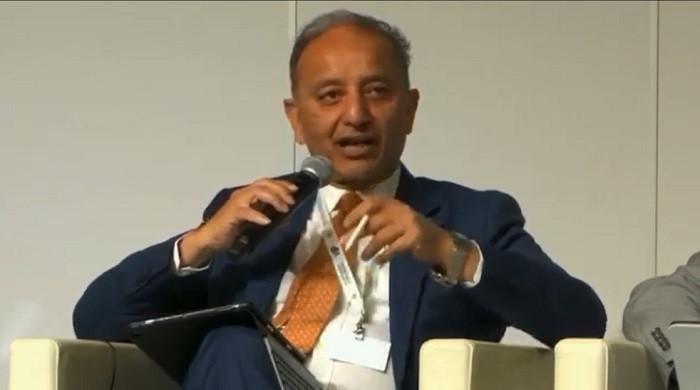Geneva: The Federal Minister for Climate Change and Environmental Coordination, Dr Musadik Malik, called on Thursday stronger international cooperation to help developing countries move to a green economy, speaking at a high -level climate conference in Geneva.
The event was organized by the United Nations Capital Development Fund (UNCDF) and took place alongside the Conference of Parties (COP) at the Conventions of Basel, Rotterdam and Stockholm (BRS) in Geneva.
Speaking during a ministerial round table, Dr. Malik stressed that global green standards should be inclusive and fair, rather than serving barriers to poorer nations.
“Green development standards should not be a burden but an opportunity for developing countries,” he said, adding: “Global standards must be for everyone, not just rich nations.”
“I think that the biggest obstacle I see is that the developing countries in the world are not visible,” he said in his opening remarks.
“But I think that when I hear this debate, which is not visible to me, are the imperatives of developing countries,” he said in the same breath.
“There is no doubt that there is an economic burden of disease to the population, in particular the poor living in developing economies.
He underlined the financial challenges encountered by countries like Pakistan, noting that its 240 million people have only $ 350 million in private portfolios – far too little to finance green initiatives.
“Without adequate resources, technology transfer and research support, a green economy remains out of reach for developing countries,” he added.
Dr. Malik has urged the international community to guarantee equity in climate policies, warning that environmental objectives cannot be achieved without including developing countries.
“Development countries must be participants active in the world economy, not left on the sidelines,” he said.
Calling on daring action, he concluded: “The world must make courageous decisions for a shared green future.
Practical barriers must be removed by mobilization of resources, not by rhetoric.
The summit continues to discuss fair climate action strategies in the midst of increasing pressure to achieve global durability objectives.
Meetings with key counterparts
On the sidelines of the conference, Dr. Malik, met Dr. Abdullah Bin Abdulaziz, Minister of the Environment and Climate Change of Qatar.
Dr. Abdulaziz has expressed its desire to strengthen bilateral cooperation and coordination on environmental issues, in the fields of the environment, climate change, the protection of clean fauna and energy, in a mutually beneficial manner.
Dr. Malik, while enjoying the transformative actions of Qatar for a greener economy, discussed the ways to benefit from the expertise and technology of Qatar in petrochemical and recycling.
Carbon trading / compensation opportunities for a regional carbon market have also been discussed.
The two ministers reaffirmed the commitment to deepen cooperation in these areas. They also decided to explore more ways to improve collaboration by exploring joint, bilaterally and other multilateral forums.
Dr. Malik is also involved in a discussion with Ciobanu Dordea, director of the circular economy at the European Commission.
During the meeting, Dr. Malik underlined the mutually beneficial economic partnership with the European Union.
He stressed that the prospects of developing countries should be more important in global environmental executives.
The Minister underlined Pakistan’s efforts to the objectives of the circular economy and sustainable development.
He has identified a number of development opportunities for green bunches to which Pakistan and European countries / companies can collaborate.
Dordea, while appreciating Pakistan’s commitment, suggested several ways to improve cooperation on various aspects related to the environment, waste management and the circular economy.
The two also discussed different ideas to increase economic cooperation between Pakistan and the private sector of EU member states in this regard.




